从历史评论角度分析《了不起的盖茨比》
从历史评论角度分析《了不起的盖茨比》

从历史评论角度分析《了不起的盖茨比》《了不起的盖茨比》是美国作家菲茨杰拉德于1925年出版的小说,是美国文学的经典之作。
小说以20世纪20年代的美国社会为背景,讲述了主人公盖茨比对美国梦的追求以及他与邻居尼克卡拉威的友谊。
从历史评论的角度来看,小说揭示了当时美国社会的困境和价值观念的转变。
首先,小说通过盖茨比这个角色展示了美国社会中追逐财富和地位的狂热。
20世纪20年代是美国经济繁荣的时期,人们普遍相信通过努力工作和机会,每个人都有可能实现自己的梦想。
盖茨比就是这样一个追求财富与地位的人物,他通过非法手段积累了大量的财富,但这并没有带来他内心的满足。
他为了追求他所认为的美国梦,不惜牺牲一切,甚至以自己的生命为代价。
这反映了当时美国社会普遍存在的对财富和地位的痴迷,人们像迷失在追逐物质享受的旋涡中,对精神世界的追求相对被忽视。
其次,小说中展示了20世纪20年代美国社会价值观念的转变。
小说中描绘了东部富人与西部新富人之间的对立。
东部富人代表着传统的家族贵族阶层,他们注重社会地位和名誉,对于梦想抱有理性和现实的态度。
而西部新富人则代表着通过个人努力赚取财富的人群,他们追求的是物质享受和社会地位的象征。
小说中盖茨比作为一个新富人,他在追求美国梦的过程中渴望得到东部富人的认可和接纳。
但无论他如何努力,他最终还是无法赢得他们的尊重。
这反映了当时社会中传统价值观念与新兴价值观念之间的冲突。
此外,小说以盖茨比和黛西的感情纠葛展现了两性关系的变化。
小说中盖茨比对黛西的执着追求体现了他对于完美爱情的向往。
黛西则既代表了当时女性的社会地位和束缚,又展示了她对于物质享受的追求。
小说中黛西选择了坚持现实的婚姻,而没有选择盖茨比的真爱。
这表明20世纪20年代美国社会的价值观念已经转变,对于婚姻的看法由爱情和家庭为基础转向了金钱和物质。
最后,小说以尼克卡拉威的视角揭示了美国社会普遍存在的道德堕落和虚伪的一面。
尼克是小说中唯一一个价值观相对固守的角色,他对于盖茨比的冒险和破坏感到不满。
了不起的盖茨比
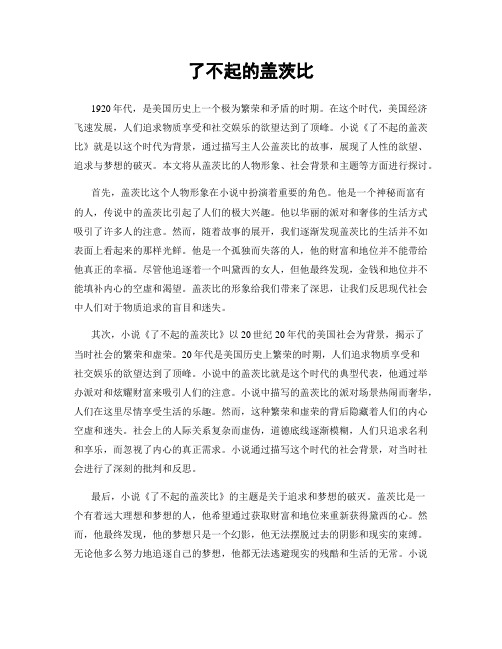
了不起的盖茨比1920年代,是美国历史上一个极为繁荣和矛盾的时期。
在这个时代,美国经济飞速发展,人们追求物质享受和社交娱乐的欲望达到了顶峰。
小说《了不起的盖茨比》就是以这个时代为背景,通过描写主人公盖茨比的故事,展现了人性的欲望、追求与梦想的破灭。
本文将从盖茨比的人物形象、社会背景和主题等方面进行探讨。
首先,盖茨比这个人物形象在小说中扮演着重要的角色。
他是一个神秘而富有的人,传说中的盖茨比引起了人们的极大兴趣。
他以华丽的派对和奢侈的生活方式吸引了许多人的注意。
然而,随着故事的展开,我们逐渐发现盖茨比的生活并不如表面上看起来的那样光鲜。
他是一个孤独而失落的人,他的财富和地位并不能带给他真正的幸福。
尽管他追逐着一个叫黛西的女人,但他最终发现,金钱和地位并不能填补内心的空虚和渴望。
盖茨比的形象给我们带来了深思,让我们反思现代社会中人们对于物质追求的盲目和迷失。
其次,小说《了不起的盖茨比》以20世纪20年代的美国社会为背景,揭示了当时社会的繁荣和虚荣。
20年代是美国历史上繁荣的时期,人们追求物质享受和社交娱乐的欲望达到了顶峰。
小说中的盖茨比就是这个时代的典型代表,他通过举办派对和炫耀财富来吸引人们的注意。
小说中描写的盖茨比的派对场景热闹而奢华,人们在这里尽情享受生活的乐趣。
然而,这种繁荣和虚荣的背后隐藏着人们的内心空虚和迷失。
社会上的人际关系复杂而虚伪,道德底线逐渐模糊,人们只追求名利和享乐,而忽视了内心的真正需求。
小说通过描写这个时代的社会背景,对当时社会进行了深刻的批判和反思。
最后,小说《了不起的盖茨比》的主题是关于追求和梦想的破灭。
盖茨比是一个有着远大理想和梦想的人,他希望通过获取财富和地位来重新获得黛西的心。
然而,他最终发现,他的梦想只是一个幻影,他无法摆脱过去的阴影和现实的束缚。
无论他多么努力地追逐自己的梦想,他都无法逃避现实的残酷和生活的无常。
小说通过盖茨比的故事,揭示了人们追求梦想的艰辛和破灭,呼唤人们要珍惜眼前的幸福,不要盲目追求虚幻的梦想。
《了不起的盖茨比》:美国暗黑时代的金钱与堕落
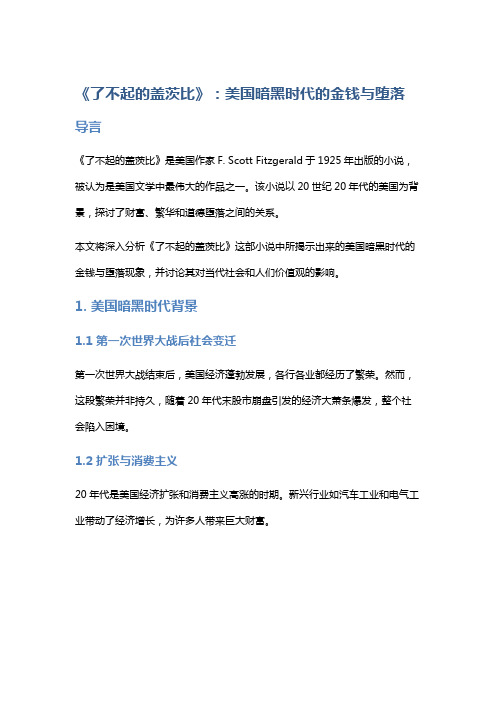
《了不起的盖茨比》:美国暗黑时代的金钱与堕落导言《了不起的盖茨比》是美国作家F. Scott Fitzgerald于1925年出版的小说,被认为是美国文学中最伟大的作品之一。
该小说以20世纪20年代的美国为背景,探讨了财富、繁华和道德堕落之间的关系。
本文将深入分析《了不起的盖茨比》这部小说中所揭示出来的美国暗黑时代的金钱与堕落现象,并讨论其对当代社会和人们价值观的影响。
1. 美国暗黑时代背景1.1 第一次世界大战后社会变迁第一次世界大战结束后,美国经济蓬勃发展,各行各业都经历了繁荣。
然而,这段繁荣并非持久,随着20年代末股市崩盘引发的经济大萧条爆发,整个社会陷入困境。
1.2 扩张与消费主义20年代是美国经济扩张和消费主义高涨的时期。
新兴行业如汽车工业和电气工业带动了经济增长,为许多人带来巨大财富。
2. 金钱与社会地位2.1 盖茨比的财富与社会地位小说中的主角杰伊·盖茨比通过不正当手段获得了巨额财富,并通过炫耀奢华来展示他的社会地位。
然而,无论他怎么努力,他也无法摆脱自己出身的阶级背景。
2.2 美国梦与金钱《了不起的盖茨比》探索了美国梦与金钱之间的紧张关系。
许多人将财富视作实现个人成功和幸福的唯一途径,但小说揭示了这种观念可能导致道德堕落和心灵空虚。
3. 虚荣与道德堕落3.1 社交场所的虚假面孔小说中描述了上层社会圈子中表面热闹、奢华的社交活动。
然而,在这些活动中,人们只追求名誉、外观和娱乐,很少有真正意义上的交流和友谊。
3.2 人性的扭曲和道德沦丧金钱与繁荣的追求使得许多角色陷入了堕落,他们为了满足欲望不择手段。
无论是派对上的放纵、通奸还是欺诈行为,这些都反映出社会价值观的扭曲和道德沦丧。
4. 对当代社会与价值观的影响4.1 财富与幸福小说中通过盖茨比这一形象告诫我们,财富并不能带来真正的幸福。
虚荣和追逐金钱可能导致内心的空虚和孤独感。
4.2 道德相对主义《了不起的盖茨比》揭示了美国暗黑时代背景下人们道德观念的混乱。
《了不起的盖茨》比深度解析
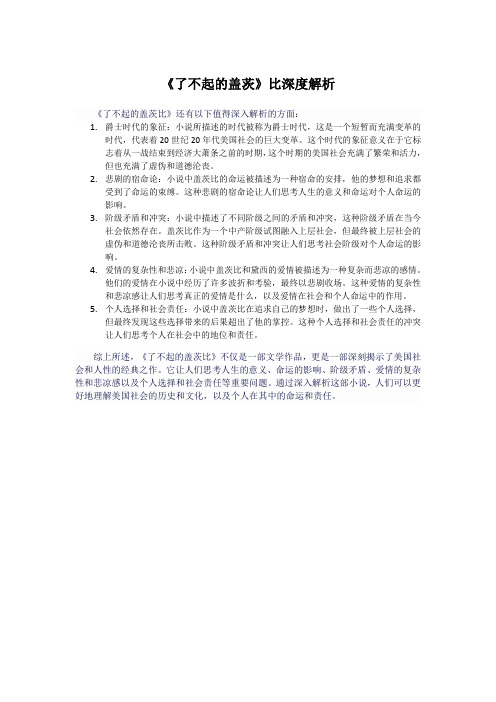
《了不起的盖茨》比深度解析《了不起的盖茨比》还有以下值得深入解析的方面:1.爵士时代的象征:小说所描述的时代被称为爵士时代,这是一个短暂而充满变革的时代,代表着20世纪20年代美国社会的巨大变革。
这个时代的象征意义在于它标志着从一战结束到经济大萧条之前的时期,这个时期的美国社会充满了繁荣和活力,但也充满了虚伪和道德沦丧。
2.悲剧的宿命论:小说中盖茨比的命运被描述为一种宿命的安排,他的梦想和追求都受到了命运的束缚。
这种悲剧的宿命论让人们思考人生的意义和命运对个人命运的影响。
3.阶级矛盾和冲突:小说中描述了不同阶级之间的矛盾和冲突,这种阶级矛盾在当今社会依然存在。
盖茨比作为一个中产阶级试图融入上层社会,但最终被上层社会的虚伪和道德沦丧所击败。
这种阶级矛盾和冲突让人们思考社会阶级对个人命运的影响。
4.爱情的复杂性和悲凉:小说中盖茨比和黛西的爱情被描述为一种复杂而悲凉的感情。
他们的爱情在小说中经历了许多波折和考验,最终以悲剧收场。
这种爱情的复杂性和悲凉感让人们思考真正的爱情是什么,以及爱情在社会和个人命运中的作用。
5.个人选择和社会责任:小说中盖茨比在追求自己的梦想时,做出了一些个人选择,但最终发现这些选择带来的后果超出了他的掌控。
这种个人选择和社会责任的冲突让人们思考个人在社会中的地位和责任。
综上所述,《了不起的盖茨比》不仅是一部文学作品,更是一部深刻揭示了美国社会和人性的经典之作。
它让人们思考人生的意义、命运的影响、阶级矛盾、爱情的复杂性和悲凉感以及个人选择和社会责任等重要问题。
通过深入解析这部小说,人们可以更好地理解美国社会的历史和文化,以及个人在其中的命运和责任。
《了不起的盖茨比》:美国繁荣时代的空虚与追逐
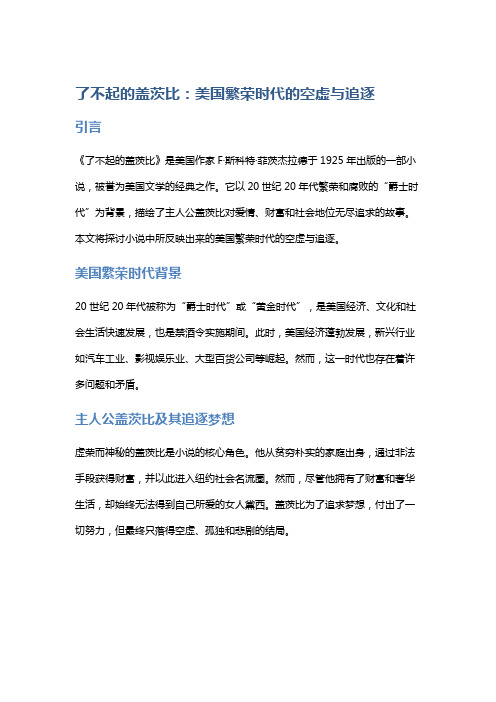
了不起的盖茨比:美国繁荣时代的空虚与追逐引言《了不起的盖茨比》是美国作家F·斯科特·菲茨杰拉德于1925年出版的一部小说,被誉为美国文学的经典之作。
它以20世纪20年代繁荣和腐败的“爵士时代”为背景,描绘了主人公盖茨比对爱情、财富和社会地位无尽追求的故事。
本文将探讨小说中所反映出来的美国繁荣时代的空虚与追逐。
美国繁荣时代背景20世纪20年代被称为“爵士时代”或“黄金时代”,是美国经济、文化和社会生活快速发展,也是禁酒令实施期间。
此时,美国经济蓬勃发展,新兴行业如汽车工业、影视娱乐业、大型百货公司等崛起。
然而,这一时代也存在着许多问题和矛盾。
主人公盖茨比及其追逐梦想虚荣而神秘的盖茨比是小说的核心角色。
他从贫穷朴实的家庭出身,通过非法手段获得财富,并以此进入纽约社会名流圈。
然而,尽管他拥有了财富和奢华生活,却始终无法得到自己所爱的女人黛西。
盖茨比为了追求梦想,付出了一切努力,但最终只落得空虚、孤独和悲剧的结局。
空虚与浮华小说中描绘的美国繁荣时代是一个表面光鲜、实则空洞的社会。
人们在金钱和物质追逐中迷失了自我,只顾着享受繁华与娱乐,忽视内心真正的需求。
各种派对、社交活动和装饰修饰成为掩盖内心空虚的工具。
迷失与道德堕落繁荣时代也带来了道德堕落。
人们为了满足欲望不择手段,在权力和利益面前放弃原则和道义。
小说中描写了无数个慾望过度、道德沦丧的形象,例如盖茨比和黛西的婚外情,以及人们为了追求快乐而陷入不正当行为。
追逐真爱与失败小说中,盖茨比对黛西的追求代表着人类对美好与完美的追逐。
然而,在浮华和虚荣的社会背景下,他们之间的爱情被扭曲、破裂和悲剧化。
最终,盖茨比死于被误解和痛苦的命运中。
结论《了不起的盖茨比》通过描绘美国繁荣时代中空虚、浮华以及追逐梦想所带来的后果,深刻地反映出那个时代人们内心深处的苦闷和迷失。
无论是贪婪一时还是执著一生,都无法满足内心对真实幸福与完美生活的渴望。
这部小说给我们敲响了警钟:在物质欲望和功利主义枷锁下,要时刻保持理性思考并重拾真正重要的价值观。
《了不起的盖茨比》反映了哪个时代的美国梦
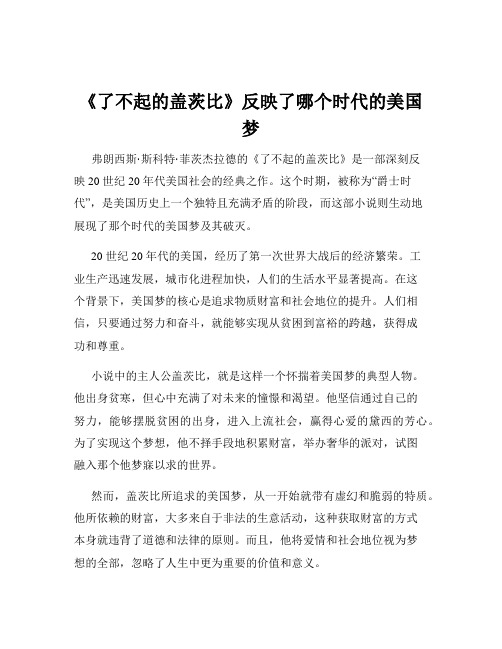
《了不起的盖茨比》反映了哪个时代的美国梦弗朗西斯·斯科特·菲茨杰拉德的《了不起的盖茨比》是一部深刻反映 20 世纪 20 年代美国社会的经典之作。
这个时期,被称为“爵士时代”,是美国历史上一个独特且充满矛盾的阶段,而这部小说则生动地展现了那个时代的美国梦及其破灭。
20 世纪 20 年代的美国,经历了第一次世界大战后的经济繁荣。
工业生产迅速发展,城市化进程加快,人们的生活水平显著提高。
在这个背景下,美国梦的核心是追求物质财富和社会地位的提升。
人们相信,只要通过努力和奋斗,就能够实现从贫困到富裕的跨越,获得成功和尊重。
小说中的主人公盖茨比,就是这样一个怀揣着美国梦的典型人物。
他出身贫寒,但心中充满了对未来的憧憬和渴望。
他坚信通过自己的努力,能够摆脱贫困的出身,进入上流社会,赢得心爱的黛西的芳心。
为了实现这个梦想,他不择手段地积累财富,举办奢华的派对,试图融入那个他梦寐以求的世界。
然而,盖茨比所追求的美国梦,从一开始就带有虚幻和脆弱的特质。
他所依赖的财富,大多来自于非法的生意活动,这种获取财富的方式本身就违背了道德和法律的原则。
而且,他将爱情和社会地位视为梦想的全部,忽略了人生中更为重要的价值和意义。
在那个时代,社会阶层的固化和贫富差距的悬殊,使得美国梦对于大多数人来说,只是一个遥不可及的幻想。
上层社会的人们凭借着家族的背景和财富,牢牢占据着社会的主导地位,而像盖茨比这样的底层人物,无论如何努力,都难以真正突破阶层的限制。
小说中,盖茨比虽然拥有了巨额的财富,但在上流社会的眼中,他始终是一个外来者,一个暴发户。
他们在他的派对上尽情享乐,却在背后对他嗤之以鼻。
当盖茨比遭遇困境时,没有人愿意伸出援手,他最终在孤独和绝望中死去。
黛西这个人物形象,也深刻地反映了那个时代美国梦的扭曲。
她代表了盖茨比所追求的一切——美丽、高贵、富有。
然而,她却是一个自私、浅薄、只看重金钱和地位的女人。
当盖茨比陷入困境时,她毫不犹豫地选择了离开,回到了自己有钱有势的丈夫身边。
论《了不起的盖茨比》中反映出的“爵士时代”的某些特征
论《了不起的盖茨比》中反映出的“爵士时代”的某些特征摘要:菲茨杰拉德的小说《了不起的盖茨比》对“爵士时代”的现象的描述是一大特色。
该小说反映出了20世纪20年代美国社会上层阶级对金钱至上的生活的追求。
本文试从新历史主义的角度分析《了不起的盖茨比》中反映出的“爵士时代”的某些特征。
关键词:《了不起的盖茨比》;爵士时代;新历史主义一.“爵士时代”的背景美国历史上,“爵士时代”是指1918年——1929年即自一战结束至经济大萧条的时期。
这既是一个浮华享乐的年代,也是人们尤其是年轻人普遍感到迷惘失落的年代。
“一切神明统统死光,一切仗都已打完,以往关于人的信念完全动摇”。
20年代是一个不同寻常的年代,既充满着财富和进步,又充斥着暴力与犯罪。
所有的一切都以惊人的速度在发展。
因此,正如马克·吐温将美国文学现实主义时代命名为“镀金时代”一样,菲茨杰拉德把这个时代命名为“爵士时代”。
在这个时期,超前消费和娱乐享受笼罩着整个国家的文化和机构,旧的道德标准已瓦解。
一批新型女郎出现在台面上,她们要求有和男人同样的自由权利,她们穿迷你裙,烫卷发,抽烟,喝酒。
因此,她们被称为“爵士时代”的“轻佻女郎”。
同时,这个时期充满了犯罪和暴力。
商人们通过不合法的手段来聚集财富;禁酒令的实行,导致了更多了暴力和犯罪。
“虽然那个时代是物质繁荣的高峰期,但同时它也标志着社会不稳定和精神空虚的开始,随着社会的前进,它们还会逐渐深化”。
“这是个疯狂的年代,困厄的时代,是年轻人蔑视人生、纵情欢乐、追求金钱和炽烈的时代,是历史上最昂贵的狂欢酒宴、到处充满暴力、人们的精神逐渐衰弱直至崩溃的时代”。
正是因为有了一个这样的时代,“爵士时代”就成了美国20年代的代名词;才造就了菲茨杰拉德--“爵士时代的桂冠诗人、发言人和编年史家”;才为美国20年代的作家们提供了创作灵感。
中国社科院盛宁先生认为,“一切文本都具有特定的文化性和社会性;同时,社会被看作相互联系相互作用的各种社会机构的总和,以文本的形式表现出来。
《了不起的盖茨比》与20世纪的美国
《了不起的盖茨比》与20世纪的美国20世纪是美国历史上一个重要的时期,也是一个极具变革和发展的年代。
在这个时期,美国社会经历了巨大的变化和挑战。
而小说《了不起的盖茨比》,作为20世纪的经典之作,生动地描绘了这个时期社会的方方面面。
本文将从几个方面探讨《了不起的盖茨比》与20世纪美国社会的关系。
首先,小说中展示了20世纪美国社会的经济繁荣与社会阶层的固化。
20世纪初美国经济蓬勃发展,社会财富迅速积累,尤其是在20年代之前。
小说中的主人公盖茨比就是以经营走私和偷税漏税致富的,他的奢华生活是当时社会富人阶层的写照。
而与此同时,社会阶层的固化也逐渐显现出来。
小说中的邻居布坎南一家和其他富人一样,通过社交和金钱来巩固和加强他们的社会地位,而工人阶级和穷人则被迫处于社会底层。
其次,小说也反映了20世纪美国社会中的道德虚伪和破碎的梦想。
小说中几乎所有的角色都有道德上的瑕疵。
盖茨比通过非法手段致富,而布坎南夫妇则以维护自己社会地位为目的,不择手段地满足自己的欲望。
作为一个本地人,尼克·卡拉韦也被迫与这些虚伪的人相处。
此外,小说中所有角色的梦想都以破灭告终。
盖茨比致力于追求与他爱的女人黛西再度相聚,但最终只得到了一次短暂的幸福,他的梦想最终破碎。
而布坎南夫妇则沉溺于虚荣和享乐的生活,没有真正追求梦想。
此外,小说中也展示了20世纪美国社会的种族问题和性别不平等。
尽管小说没有详细描述,但其中的黑人角色却展示了当时美国社会中的种族歧视。
他们被剥夺了平等的机会和权利,被社会边缘化。
而女性角色黛西则处于男性支配与控制之下,缺乏独立和自由。
她被布坎南夫妇看作是一个物质的象征和附属品,而不是一个自主思考和追求梦想的个体。
最后,小说也反映了20世纪美国社会中的荒诞和脆弱。
作为一个象征着富裕和成功的人物,盖茨比却是一个内心孤独而脆弱的人。
他的奢华生活和派对只是掩盖了他内心的空虚和无助。
与此同时,小说中充斥着人们的虚荣和浮华,追求物质和享乐的生活方式成为当时美国社会的主流。
《了不起的盖茨比》新历史主义分析
目录
01 一、背景介绍
03 三、人物塑造
02 二、历史背景分析 04 四、主题思想总结
目录
05 五、重要段落分析
07 参考内容
06 六、结论与建议
《了不起的盖茨比》是美国作家F·斯科特·菲茨杰拉德的代表作,通过对 上世纪20年代美国社会生活的描绘,深刻反映了美国梦的破灭和资本主义社会的 虚无。本次演示将从新历史主义的角度分析这部作品,探讨小说中的历史背景、 人物塑造和主题思想。
二、历史背景分析
小说中,盖茨比所处的历史背景是20世纪20年代的美国。这个时期是美国历 史上一个非常特殊的时期,被称为“咆哮的20年代”。这个时期的特点是社会的 繁荣与活力,人们的消费观念、生活方式和道德观念都发生了深刻的变化。然而, 这个时期的美国也存在着严重的社会问题,如贫富差距扩大、道德沦丧、人们追 求享乐、沉迷于物质生活等。这些社会问题在小说的情节和人物塑造中得到了充 分的体现。
《了不起的盖茨比》的主题思想是深刻而复杂的。首先,小说揭示了美国梦 的虚无和破灭。盖茨比追求的是美国梦,他认为通过自己的努力可以成为上流社 会的一员,并得到他心中的女神黛西。然而,最终盖茨比的追求只带来了悲剧的 结局。这表明了在一个金钱至上、道德沦丧的社会中,美国梦的实现是遥不可及 的。
其次,小说揭示了人性的虚伪和脆弱。盖茨比和黛西之间的关系被描绘得既 复杂又真实。虽然他们曾经相爱过,但随着时间的推移,黛西对盖茨比的爱产生 了动摇。她更的是自己的地位和财富,而不是盖茨比的感情。这种描写揭示了人 性的虚伪和脆弱,表现了人们在追求物质利益时,往往会忽视真爱的价值。
最后,从结构主义的角度看,《了不起的盖茨比》展示了美国社会的矛盾和 冲突。盖茨比的失败揭示了美国社会的阶级固化、道德败坏以及人性的虚伪。他 的理想主义与现实之间的鸿沟无法弥合,这使他的追求变得荒谬和无奈。
《了不起的盖茨比》时代背景了解与文学解析
《了不起的盖茨比》时代背景了解与文学解析1. 引言1.1 概述在美国文学史上,《了不起的盖茨比》是一部备受赞誉和争议的小说。
作者F·斯科特·菲茨杰拉德通过这本作品深入揭示了上世纪二三十年代美国社会背景下的种种问题与现实困境。
小说以独特而细腻的笔触,展现了当时社会精英、追逐财富的人们所经历的悲伤、欲望以及对幸福的执着追求。
本文将通过对《了不起的盖茨比》时代背景进行深入剖析,并对其进行全面的文学解析,致力于探讨该作品在当今社会中所带来的启示与影响。
1.2 文章结构本文分为五个主要部分,分别是引言、时代背景了解、《了不起的盖茨比》文学解析、启示与影响以及结论。
首先,在引言部分,将简要介绍《了不起的盖茨比》这部小说,并明确文章研究的目标与意义。
其次,在时代背景了解部分,我们将从美国上世纪二三十年代社会背景、政治经济环境与社会观念变迁以及流行文化与艺术表现形式等方面,全面了解小说发生的时代氛围。
然后,在《了不起的盖茨比》文学解析部分,我们将对小说的主题与情节进行梳理,分析人物关系和角色塑造,并深入研究小说中所使用的符号意义,从中揭示出当时社会存在的问题和挑战。
接着,在启示与影响部分,我们将对当代社会进行对比与思考,评述《了不起的盖茨比》所具有的文学价值和意义,并总结该作品为我们带来的启示和警醒。
最后,在结论部分,我们将简要概括文章内容,并对整体研究进行回顾并给出自己的见解。
1.3 目的本文旨在通过对《了不起的盖茨比》时代背景的深入了解和全面剖析,探讨这部作品在当今社会中所带来的启示和影响。
通过挖掘小说中蕴含的人性、财富、爱情等主题及其符号意义,我们可以更好地理解这一年代背景下人们内心世界的动态和复杂性。
同时,借鉴小说中塑造的人物形象与角色关系,可以对当代社会中的人际关系、追求财富的心理状态等问题进行深入思考。
通过本文的撰写,我们将希望读者能够更全面地了解《了不起的盖茨比》所呈现的时代背景以及其中蕴含的社会意义,从而提升对这部经典文学作品的理解和欣赏水平。
- 1、下载文档前请自行甄别文档内容的完整性,平台不提供额外的编辑、内容补充、找答案等附加服务。
- 2、"仅部分预览"的文档,不可在线预览部分如存在完整性等问题,可反馈申请退款(可完整预览的文档不适用该条件!)。
- 3、如文档侵犯您的权益,请联系客服反馈,我们会尽快为您处理(人工客服工作时间:9:00-18:30)。
从历史评论角度分析《了不起的盖茨比》An Analysis of The Great Gatsby from the Perspective of Historical CriticismAbstract:The Great Gatsby is one of the twentieth century's brilliant works, and alsoF. Scott Fitzgerald's most outstanding work. This novel wins the writer agreat deal of acclaim from a substantial number of researchers andscholars. This thesis is to make a tentative study and exploration of thewriter's own life experiences and its reflections in this novel, which isanalyzed from three perspectives. The thesis begins with the backgroundof the 1920s, including historical background and literature background,which can help us know much better about the writer and the work. Thenthere is a brief summary of the general academic achievements made bymany scholars and researchers. After that, detailed and specific analysiswill be made on the similarities between Fitzgerald’s and Gatsby’s lifeexperiences: Fitzgerald’s dream and Gatsby’s dream, The East and theWest v.s. the East Egg and the West Egg, New York and the “Ash Valley”.Based on the above analysis, we can see that there are some similaritieshidden in Fitzgerald’s world and Gatsby’s world.Key words: F. Scott Fitzgerald; The Great Gatsby; historical criticism; similarities摘要:《了不起的盖茨比》是二十世纪最优秀的小说之一,也是司各特·菲茨杰拉德最具代表的作品。
这部小说赢得了众多研究家与学者的普遍关注。
本篇论文探究的是作者人生经历和它在这部作品中的反映。
本文将从以下三个方面进行分析此观点。
首先,本文介绍了十九世纪二十年代的背景,包括当时的历史背景与文学背景。
这些能够帮助我们更好的了解作家与该作品。
然后是对菲茨杰拉德的学者和研究者的学术成果的概述。
这之后将详细展开菲茨杰拉德与盖茨比人生经历的相似之处的分析与研究:菲茨杰拉德和盖茨比的梦想,东西部和东西卵以及纽约市和“灰谷”。
根据以上分析,我们可以发现菲茨杰拉德的世界与盖茨比的世界之间隐藏着一些相似之处。
关键字:菲茨杰拉德;盖茨比;历史批评;相似之处I.Introduction (1)A. Historical background and the definition of historical criticism (1)B. Literature background (1)C. Fitzgerald and The Great Gatsb y (2)II. Literature Review (3)A. Theme (3)B. Narrative techniques (4)C. Cultural studies and feminist studies (4)D. Morality studies (5)III. The Similarities between the Reality and the Story (5)A. Fitzgerald’s dream and Gatsby’s dream (5)1. Fitzgerald’s dream (5)2. Gatsby’s dream (6)B. The East and the West v.s. the East Egg and the West Egg (7)1. The East and the West (7)2. The East Egg and theWest Egg (8)C. New York and the “Ash Valley” (8)IV. Conclusion (9)Works Cited (10)I. IntroductionA. Historical background and the definition of historical criticismThe 1920s in the United States has been described as a period of material success and spiritual frustration. First, the United States made a great deal of money in the war and became, as a whole, a lot richer, so that there appeared an economic boom, a deceptive affluence, when the war was over. All of sudden automobiles and radios appeared which helped to widen the horizon of the people and increase their knowledge. The movie revolution and the music, notably Jazz, now becoming available to everybody, enriched and impacted the way of popular thinking. The country became urban in these years; a new tape of industrial economy developed. Mass production, mass consumption, and mass leisure became essential to economic and cultur al life and were soon to dominate the nation’s culture and institutions.Unfortunately, also because of the First World War, the heroism, patriotism and the zeal for democracy that the romantic notion of war had inspired now proved to be false and tasteless to a generation who had faith in them. Excitement and enthusiasm subsided to make way for disillusionment. It was as if the party was over and an anti-climax of disillusionment and restlessness and disgust followed. What’s more, modern science destroyed man’s ability to believe unquestioningly. At the same time, there was a general feeling among many who were living through it, that this was “a sad period, the dream had failed, and the country was building up economic troubles all along and heading direc t toward disaster” (Chang 154-56).Historical criticism means getting more information by reading related histories of the time-period that the story is written in. This doesn’t only make readers get the idea of the things they didn’t understand but also h elps them get a deeper understanding of the theme and details of the story. And by analyzing the evidence of the story, readers can see that there are always a lot the author inferred but didn’t tell. These are surprises left for readers to search which from these they can learn a lot more about the story.B.Literature backgroundIn the age of fast-paced and “roaring” change, American fiction of the 1920s registered a sense of purposelessness, decadence and cultural emptiness. It alsocaptured both “an excitement about the new and an anxiety about the historical loss”(Toming 239). Many masterpieces are based on writers’ own experiences of the First World War, the main characters changed deeply; they were no longer the nobody who was from a small town. These so called “the Lost Generation” writers declaimed the war on value outlook, the old heroism and life style and morality in the present time, such as T. S. Eliot’s The Waste Land, Faulkner’s Soldier’s pay, Hemingway’s The Sun Also Rises as well as The Great Gatsby of Fitzgerald. “The protagonists are all soldiers back into the new world, they find the human nature has been distorted, and there appeared a gap between the past and present living situation. Why? It’s because the present life became decadent and dispirited” (Yang 214-15).Yet in the decade of 1920s American literature achieved a new diversity and reached a new diversity and reached its greatest heights. In 1920, F. Scott Fitzgerald said “An author ought to write for the youth of his generation, the critics of the next, and the schoolmasters of ever afterwards.” Fitzgerald wrote about what he saw during the 1920s, which he dabbled the Jazz Age, and The Great Gatsby is considered a correct depiction of that era.C. Fitzgerald and his The Great GatsbyF. Scott Fitzgerald (1896-1940), a famous American writer. He is often acclaimed the spokesman of Jazz Age. He is so central to the American that it would be difficult to picture that time fully if he had not existed. Part of his central role has to do with the style with which he responded to his experience, which made him see certain aspects of the life of the twenties more clearly and deeper than his contemporaries. In his novels, Fitzgerald unfolds before us the fashion, the luxury, the deceit and the emptiness of social life of 1920s. One of the distinguishing features of his works, like the others writers in his age, is parallel between his characters and his own experiences. Written on 1925, The Great Gatsby is one of the greatest literary documents of this period, which wins many favorable praises. And it is also the central to the literature of the twenties, and it is in the mainstream of American realism as it emerged after World War I.Fitzgerald’s greatness lies in the fact that he found intuitively in his personal experience the embodiment of the nation and created a myth out of American life. The story of The Great Gatsby is a good illustration. Gatsby is a young guy from the Midwest. He falls in love with Daisy, a wealthy girl, but is too poor to marry her. Thegirl is then married to a rich man, Tom Buchanan. Determined to win back his lost love, Gatsby engages himself in bootlegging and other “shady” activities, thus earning enough money to buy a magnificent house. Then he spreads dazzling parties every weekend, hoping one day the Buchanans will come. They finally come and Gatsby meets Daisy again. But the woman before him is not quite the ideal over of his dream and they can never repeat the past. Then Daisy kills a woman (Tom’s mistress) in an accident and plots with Tom to shift the blame on Gatsby. Finally, Gatsby was shot and the Buchanans escape.The Great Gatsby caught superbly the spirit of a decade, and was classified as a book about the Roaring Twenties. It is one of those novels that richly evoke the texture of their time and become literary classics; they become a supplementary or even substitute from of history. Gatsby and the novel in which he lives have become firmly fixed in the popular culture, in academic evaluation of literary achievement. Now people keep reading it. Ever since its publication, the novel has received warm discussion from critics. They analyzed the novel from different perspectives.II. Literature ReviewThe researches and studies on Fitzgerald have been carried on both at home and abroad. He enjoys both national and international fame. Ever since the 1950s, Fitzgerald has been drawing attention from scholars and critics from many countries.A. ThemeA great part of the critical attention has been focused on the theme. Many believe that the theme of The Great Gatsby is the American dream. “The theme of The Great Gatsby is the pursuit of American dream and the desertion of American dream,” Diao Keli argued in “On the Theme of The Great Gatsby” (Diao 82-88). To Zhang Lilong, “The Great Gather is actually a recall and summary of the process of the involvement of the American dream from historical and realistic perspectives” (Chang 108-109). Some others pointed out that Gatsby’s tragedy could represent that of all the Americans at that period of time. “The tragedy of Gatsby is also the tragedy of Fitzgerald. The tragedy is of all the pursuers of American dream.” Wang Yujuan says in “The Reasons of Great Gatsby and ‘American Dream’”, and argues “the dream of Gatsby is also the dream of all typical Americans. The defeat of Gatsby is in fact theloss of all the Americans” (Wang 28).Critics abroad have paid much attention to the theme of The Great Gatsby as well. They regard its theme as the failure of the American dream through Gatsby's personal experien ce. “The Great Gatsby is an exploration of the American dream as it exists in a corrupt period”“critics from several different generations have noted how Fitzgerald used his conflicts to explore the origins and fate of the American dream and the related i dea of the nation” (Callahan 48).B. Narrative techniquesThe unique narrative techniques also receive much attention. Cheng Aiming in his “The narrative Technique of The Great Gatsby analyzes the narrative technique of the novel from three aspects: the narrator, point of view, and writer, narrator, character, and reader. He concludes that the writer makes the character in this novel the narrator to develop the story skillfully” (Cheng 130). This unique technique creates aesthetic distance between the writer, the narrator, the characters and the readers, producing original artistic effect. Toming points out, “With this narrative point of view in place, the novel achieves a balance between involvement and distance, romantic passion and critical irony” (Toming 241).C. Cultural studies and feminist studiesIn the 1970s, the study of literature was influenced by cultural studies and feminist studies. The novel's representation of women, race and sexual identity were interrogated. Some critics argued that Daisy was considered a person in her own right and not just an object of Gatsby's desire. Some noted a homosexual dimension in Nick's relationship to the men in the novel, and most recently the conclusion that Gatsby is black has been made. From th e author’s aspect, some critics point out great similarities between Fitzgerald and Gatsby. Like Fitzgerald, what Gatsby schemes for, and ultimately does, is not for money itself but for the fact that it will take him near to his beloved. “In The Great Gatsby,Fitzgerald exactly and beautifully canalized the various stands of his own temperament一his essential ‘Westernness’, his sensibility beyond the sensibility of the class he clung to” (Clarke 129). A comparison between Fitzgerald and Hemingway also arouses critics' great interest.D. Morality studiesSome researchers and critics attached importance to Fitzgerald’s morality. In recent years, some critics such as Henry Dan Piper and Frederick J. Hofman, are beginning to be conscious of the writer’s moral sense which is pervasive in almost all of his major works, and The Great Gatsby is no exception. The awareness of this, as a matter of fact, helps to push a little forward the study of Fitzgerald, because this is also an essential and indispensable part of Fitzgerald's character and personality.III. The Similarities between the Reality and the StoryViewed above from all researches both domestic and abroad, Fitzgerald’s The Great Gatsby is actually a great novel that everyone can have different interpretations from different perspectives. This paper is intended to have a try to analyze the theme of The Great Gatsby in terms of historical criticism. In achieving this, the following three aspects will be explored to find the similarities between the reality and the story.A. Fitzgerald’s dream and Gatsby’s dream1. Fitzgerald’s dreamThe novel deals with Gatsby, an idealist’s mythological tragedy of pursuing his dream, reflecting the disillusion of the “American drea m.”The “American dream”refers to the common belief held by the Americans that everyone can achieve success by means of intelligence and hard work. The original mythology of the “American dream”mirrors people’s wish es to build “this side of Paradise”on the American Continent, because in the Europeans’ eyes, this land was rich in opportunities since the first immigrant. In his literary works, Fitzgerald was concerned on the other aspect of the “American dream,”namely, the degenerated American heroes who have experienced the splendid summit of their lives under the pen of such outstanding writers, as Henry James, Hemingway and Faulkner, but finally perish after the ruin of their illusions.The Great Gatsby, as F. Scott Fitzgerald's finest novel, is a sensitive and symbolic treatment of themes of contemporary life related with irony and paths to the legendary of the American Dream. The author identifies himself with his writing of the Jazz Age in 1920s and the corruptible American Dream; in The Great Gatsby he admires Gatsby's obsession in his incorruptible dream, although he still feels theessential loss in the perverted dream simultaneously. The certain vision again affects the author's own life. He will be inevitably trapped in his own complex conflicts between his illusion and reality: He is either realizing the uncertainty in his vision or making his dream come true. Meanwhile, by structuring his book with the dual heroes interwoven in, Fitzgerald exposes the tension out of his own double vision. Like Jay Gatsby, Fitzgerald experienced his ow n “Crack- Up” in longing for his success. The parallel between Fitzgerald and Gatsby reveals the same subject. Fitzgerald himself illustrated the paradox. That is, a worship of success so intense that it virtually insures a conviction of personal failure. Given that Fitzgerald was so completely a man of his own time and his own culture, we must admit that he could have identified himself with Jay Gatsby.2. Gatsby’s dreamBeing born of low extraction, what Gatsby can do at the age of seventeen is to change his legal name “James Gatz”to “Jay Gatsby”which sounds like “son of Jesus”(Fitzgerald 81), as his first step to break away from his mediocre family and seek business success. Like Huckleberry Fin, an American hero created by Mark Twain, Gatsby begins h is adventure from the water: at first “for over a year he had been beating his way along the South shore of Lake Superior as a clam-digger and a salmon-fisher or in any other capacity that brought him food and bed” (Fitzgerald 81), and later he met his Savior---Dan Cody, and began his career on the sea as a mate, skipper, secretary and even jailor, and won Dan Cody’s trust from which he got singularly appropriate education; and during the five years, “the vague contour of Jay Gatsby had filled out to the su bstantiality of a man” (Fitzgerald 83).After he fell in love with Daisy, Gatsby begins his arduous love adventure which finally turned out to be a fatal strike on him: Daisy married a rich upper-class man who could sustain her abundant life and meet her vanity. From then on, Gatsby had been always holding up Daisy as his beautiful dream for which he sworn to reach at all costs. He went abroad and made a big fortune through bootlegging, and ascended into the rich class, realizing his dream of extricating himself from poverty. However, Gatsby failed to be really adopted by the upper class: the guests invited to his banquet wagged tongues at great length, wondering the host’s origin and true identity; he was framed up by his lover, Daisy and her husband; and except for his humble father who was the only person took pride in him, as well as his neighbor, Nick, no one attendedGatsby’s funeral. Till then, Gatsby’s dream was completely shattered.Gatsby is great because he has his pursuit. Inspired by the individualism, he thought he could get what he desires: money and love. Born with poverty, he has his own disciplines to be talent. He rises from the poverty and realizes his dream of being rich. He has the freedom to pursue his happiness as he is taught to. He devotes all his effort to win his lover’s heart. Though he is loyal to his love and is considerate to others, he is doomed to fail at the end. It is not Gatsby’s inner personality defects that cause his ruins but the society that creates his greatness and then again ruins it completely.In conclusion, Gatsby’s dream stands for Fitzgerald’s dream, for his time’s dream, and his wretched fate implies the whole nation’s tragedy; and thus, the “Gatsby” has transcended himself as an individual, and becomes the extension of the archetypal heroes.B. The East and the West vs. The East Egg and the West Egg1. The East and the WestFor a long period of time, the divergence and conflict between the East and the West have been serious. The early American culture prospered from the eastern colonies where the national culture had not been well developed. After the Independent War, though breaking off the political relations with British, the young America still interrelated with the suzerain on culture and ideology. With the advancement of American civilization to the Middle West, the vigorous spirit of the early explorers and immigrants was brought to this area; and the easterners who turned to more ardently to the European culture, reinforced their relationship with the traditional culture, and thus, the gentle conservation was formed. During the course of pioneering, the western civilization presented new vitality, bringing more freedom and opportunities. Therefore, the sharp contrast between the East and the West came down: the former symbolizing complication and the latter simplicity. Fitzgerald’s diligent arrangement highlights Gatsby and Tom’s opposite on their class origin, experience and morality, and deepens the theme. In addition, Nick’s pilgrimage from the West to the East and then returning to the West would show his spiritual tracing and seeking for his own “civilization”rather than the special shift. Coming from a prominent and well-to-do family in the West whose prosperity benefits from thedevelopment of the Western frontier, Nick once proclaimed this land to be “the warm center of the world”(Fitzgerald 2), yet, the war broke his quiet life and spiritual sustenance, and he left for the East, which had finished the Industrial Revolution. The superficial prosperity seems to give Nick the opportunity to start a new career. However, Gatsby’s tragedy smashes Nick’s confidence on his nation’s civilization, and he has to return to the starting point. The cycle of both the place and the conduction constructs a hermetic space which makes people feel stifle and hopeless and urges them to introspect the root of the problems.2. The East Egg and the West EggThe contrast and conflict between the East Egg and the West Egg which are both acting place and have been converted into metaphor, deepen further the theme of revealing Gatsby’s tragedy. The two looks like “a pair of enormous eggs, identical in contour and separated only by a courtesy bay,”“They are not perfect ovals---like the egg in the Columbus story, they are both crushed flat at the contact end” (Fitzgerald 4). Then, Nick proclaims that, except shape and size, they have dissimilarity in every particular. The Buchanans who originate from rich and honorable families live in the East Egg; Emerging from poverty and obscurity, Gatsby lives in the West Egg. The green light of the East Egg keeps guiding the latter, and becomes the example of it. Gatsby pursues stubbornly the principle of restraint abided by the early Puritan easterners, and vainly attempts to establish a successful mansion in the Franklin way which has been antiquated for a long time. The American dream fails to find its realization on Gatsby who applies of copy mechanically. What he has really established adhering to the successful model---the East Egg, is nothing but the illusory mirage which disappears with Gatsby’s death.C. New York and the “Ash Valley”New York and the “Ash Valley” are pregnant with symbolic meaning. With the completeness of the Industrial Revolution in the East, the New York city became the center of modern civilization. However, the only road from the West Egg to New York passes through an “Ash Valley”on which the writer spared no expense to describe concretely. “This is a valley of ashes---a fantastic farm where ashes grow like wheat into ridges and hills and grotesque gardens; where ashes take the forms of houses and chimneys and rising smoke and, finally, with a transcendent effort, ofash-gray men who move dimly and already crumbling through the powdery air”(Fitzgerald 19).The modern wasteland, the “Ash Valley”is permeated with the strangled and hopeless atmosphere in which Mr. Wilson and his wife live. Having been cheated from start to the end, Wilson who credulously believes Tom and mismurders Gatsby, is a pitiful character, too. Dreaming of extricating from poverty, Mytle follows Tom to New York where they perform the foul deed of both money and flesh. The Wilson’s’bitter experience and wretched end reflect incisively the darkness and corruption of the center of civilization. Occupying an important position in the narrative texts, the special structure is always connected with the characters’perceptions and becomes the signified language through which the writers acquire a more direct channel to constitute a contrast and thus deepen the theme.IV. ConclusionIn a word, The Great Gatsby is not only a love tragedy among Americans from the upper class, but also a record of American society of 1920s. Through the fiction people can know the history and social background of that time much more deeply: the cars played an important role in modern society; the life style of entertainment world, such as actors, directors and so on; the modern office lady’s life and love conception; people’s different attitude on moral standard and cultural custom and so on. In The Great Gatsby, Fitzgerald criticized American society in 1920s; Fitzgerald portrays the 1920s as an era of decayed social and moral values, evidenced in its cynicism, greed, and empty pursuit of pleasure.The greatness of The Great Gatsby rests with the autobiography of Fitzgerald himself, his experience, his reflection, that is to say there are some similarities hidden in Fitzgerald’s world and Gatsby’s world. Fitzgerald used his main character to show his own feelings under the special historical background, which they both had. This thesis aims to call people's attention to the writer’s historical b ackground under which he created this great work, as well as Fitzgerald’s life experience, so that we can reveal much more details about the “myth” --- Gatsby. It may also serve as a key to a wider and deeper understanding and interpretation of Fitzgerald’s works.What’s more, Fitzgerald,with his unique writing skills and excellent narrative style,left us a record of 1920s——its decaying thoughts-and corruptive society. Wecan go back to that “Roaring Age”, and to feel what the author had suffered.Works CitedCallahan, John F. “F. Scott Fitzgerald’s evolving American Dream: the ‘pursuit of happiness’in Gatsby, Tender is the Night, and The Last Tycoon”. Twentieth Century Literature (1996).Chang, Yaoxin. A Survey of American Literature. Tianjin: Nankai University Press, 2003.Clarke, G raham. “Critical Assessments of Writers in English”. Helm Information (1991).Fitzgerald, F. Scott. The Great Gatsby. Shanghai: International Book Press, 2008. Toming. A History of American Literature. Nanjing: Yilin Press, 2002.程爱民.《20世纪英美文学论稿》[M]. 上海:上海外语教育出版社,2002刁克利. “盖茨比的悲剧与菲茨杰拉德的证明”--《了不起的盖茨比》主题论[J]. 《河南大学学报》,1994 (2)王玉娟.盖茨比悲剧原因探究. 《学术交流》[J]. 1998 (2)杨仁敬.《20世纪美国文学史》[M]. 青岛:青岛出版社,1999张礼龙. 美国梦的演变与破灭--《了不起的盖茨比》评析[J]. 《外国文学研究》,1998(2)。
